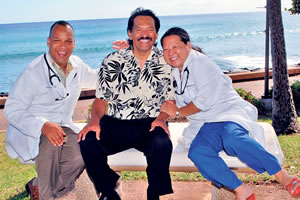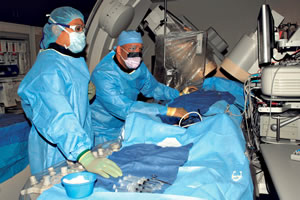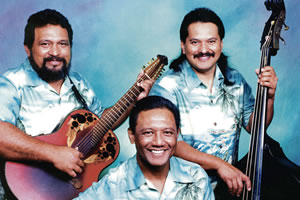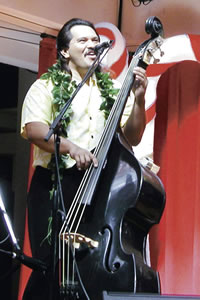You Gotta Have Rhythm

John Koko of the Makaha Sons with doctors Kevin Kwaku and Joana Magno. Nathalie Walker photo. nwalker@midweek.com
Musical icon John Koko passed out on stage and might have died but for fast-acting fans who knew CPR. He and the doctor who brought him back, Joana Magno, and the one who cares for him Kevin Kwaku, want more folks to learn the life-saving skill
John Koko and the doctors who saved his life talk about his heart condition, and the need to have more people trained in CPR
On Dec. 18, almost two years ago, the day started off like any other for the Makaha Sons. Moon Kauakahi and brothers John and Jerome had just completed a gig at Chai’s Island Bistro.
But then John sat down, feeling a bit lightheaded and short of breath. Someone handed him water, “John, you don’t look too great.”
“That’s the last thing I remember,” says John Koko. “I simply blacked out on stage, and when I woke up I was in Queen’s hospital. My brother Jerome and son Shadow said it was a scary moment for everyone at the show.”

Dr. Kevin Kwaku (right) conducts a ventricular tachycardia radio frequency ablation on a patient using Carto 3-D mapping, with the assistance of Travis Fernandez, RT. Nathalie Walker photo
The Makaha Sons, a mainstay of Hawaiian music, have faced their share of medical emergencies. It’s been a couple decades now since the Makaha Sons lost that great pillar of Hawaiian music and original member of the band Israel Kamakawiwo’ole, as well as his older brother and fellow band member Skippy, both because of health issues.
Now John, at 49, had suffered cardiac arrest onstage, the result of an already weak heart and a rough year for the family. In just a few short months, he and Jerome had witnessed the passing of their mother, father and several siblings. On John’s fateful December day, Dr. Hans Odsen and CPR-trained health care responder Peggy Marcus happened to be on hand, quickly providing CPR until the EMS team arrived.
Thankful for his life, John is eager to see cardiopulmonary resuscitation become common knowledge in every household. His hope is for all intermediate and high school children to learn it in classrooms. When the issue hit home for his own children, they signed on right away to take CPR classes.
Statistics on cardiac arrest from the American Heart Association (AmericanHeart.org) are bleak: Less than 8 percent of the 300,000 Americans who suffer cardiac arrest outside the hospital survive, and it’s because victims rarely receive effective CPR from bystanders. Many victims of cardiac arrest appear normal and are unaware they have heart problems. Hoping to create public awareness, John gave his cardiologist Dr. Kevin Kwaku, director of cardiac electrophysiology at Kaiser Foundation Hospital, and Dr. Joana Magno, who took care of him when he was rushed to the Queen’s Medical Center, permission to speak candidly with MidWeek about his medical history and prognosis.

The classic Makaha Sons: Jerome Koko, Moon Kauakahi and John Koko. Photos courtesy of the Makaha Sons
Magno starts by defining “cardiac arrest.”
“Cardiac arrest is when the heart rhythm goes erratic and your heart stops. A heart attack is where an artery blockage causes damage to the heart,” she says. “You can have cardiac arrest with or without a heart attack. John didn’t have artery blockage, he had weakness of his heart muscle.”
Minus the long history and a gauntlet of technical terms, John has had a weak heart since he was a kid, necessitating open-heart surgery twice to replace problematic heart valves. Valve disease, meanwhile, led to weakening of the pumping heart muscle, resulting in cardiac arrest and abnormal heart rhythms. The talk has come up about adding his name to the heart transplant list, but that’s a last resort as each successive surgery becomes more risky.
John lifts his shirt to reveal physical evidence of his ordeal a map of scars and a raised patch of skin hinting at his latest surgery, an implanted defibrillator (ICD), which also acts as a pacemaker. Kwaku explains how it works:
“A pacemaker is an implantable device with wires that go to the heart through a vein. It is used to prevent a patient’s heartbeat from going too slow it can set the heart’s pace. An implantable defibrillator can do that too, so all implantable defibrillators are also pacemakers. A defibrillator can also provide an internal electric shock, similar to an external one delivered through paddles as seen on TV, to ‘reset’ a heart’s rhythm that has gone awry (and which otherwise would) lead to loss of consciousness and sometimes death. Hence, an ICD can rapidly treat a cardiac arrest and save lives. Once implanted, these devices have little impact on dayto-day life. They basically watch and monitor, ready to act whenever needed, sort of like a guardian angel.”

John, more recently, with his upright bass. Photos courtesy of the Makaha Sons
Though a lifesaver, the defibrillator took some adjusting to and required some fine-tuning. The first time it fired, John’s wife Toni said it scared the heck out of the family, like a ghost had hurled John across the room. John said initially the device went off up to 13 times in one night.
“The scariest part is getting shocked while performing. It happened to me twice on stage,” he adds, and for a man who travels the globe 11 months out of the year to perform, going through airport security with a defibrillator is an added hassle, not to mention the long, tiring hours and the doctor’s mandate that he not carry anything heavy. “It’s been a long and winding road, but, I’ve been blessed and grateful I’m still alive. I have a beautiful wife, four sons John Jr., Shadow, Jordon and Jerry a grandson and another grandbaby due in February.
“I’ve learned to be thankful for everything, good or bad.”
The statement is disconcerting, but Magno explains that with all John has been through, he has a heightened appreciation for life. He’s been exercising and keeping healthy, and despite his tribulations, John is Mr. Upbeat. His emails, his face-to-face conversation, his smile it’s all cheerfulness, thankfulness and loving sentiment.
He offers up boundless expressions of gratitude for family and the myriad health specialists who’ve helped him along the way.

Dr. Magno listens to the heartbeat of patient Charles Duvauchelle Jr. Nathalie Walker photo, nwalker@midweek.com
When questioned about the biggest realization he’s gotten out of the trying experience, he resorts to the best medicine of all. “I’ve learned not to piss off my wife because she’s the one taking care of me!” he replies, laughing heartily.
So what is it that keeps Hawaii’s favorite bass player ticking?
“I enjoy performing, playing music, that’s what keeps me going,” he answers decidedly. John says he’s getting the best care the world has to offer and that he has no plans to retire. And his doctors are pleased with his current bill of health.
“John is enjoying a period of relative stability after a very bumpy year. However, with a heart like his, the prognosis will forever be ‘guarded,’ in medical parlance,” notes Kwaku. “But the man is a class act on stage and off. More than once now he’s stared death in the eye. Folks like Dr. Magno, myself and other members of his medical team are just happy to do our part to help him keep the rhythm going.”
Kwaku and Magno are big fans of music, being closet musicians themselves Kwaku has a dusty saxophone somewhere in the house and Magno majored in music, playing clarinet and oboe, before settling on med school. Magno’s voice suddenly softens as she recalls the early days in her medical career.
“I remember as an intern,” she says, “which was about 30 years ago, one of the first people who came to the hospital in cardiac arrest was Skippy Kamakawiwo’ole. He had a heart problem related to his size. That was a very sad day at the hospital. I remember the kids who were in the ER doing CPR, they tried and they couldn’t get him back. And then Iz was in the hospital, too. Queen’s is quite connected to many people in music, Hawaiian music in particular.
“So when John came in, it was like John, you’re the bass player of the Makaha Sons. The sound can’t stop, you know? Every single time I listen to their music, it’s just pure joy. I feel that the music is still there and will continue for a while.
“We want to keep it that way.”



